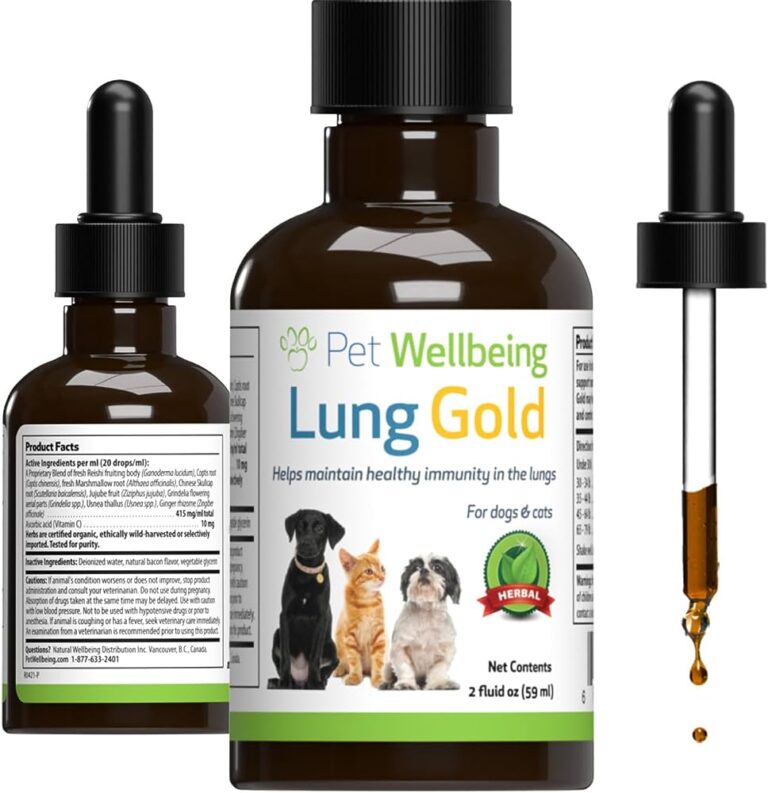To naturally remove fluid from a dog’s lungs, try using a humidifier or steaming up the bathroom and allowing the dog to inhale the moist air. Additionally, you can also consider giving your dog herbal remedies like licorice root or marshmallow root to help reduce inflammation and promote respiratory health.
Keep in mind, however, that fluid in the lungs can be a serious condition, so it’s essential to consult with a veterinarian before attempting any natural remedies. When our furry companions experience health issues, such as fluid buildup in their lungs, it can be distressing for both the pet and the pet parent.
The good news is that there are natural remedies that can help alleviate this condition. We will explore some effective ways to naturally remove fluid from your dog’s lungs, providing them with much-needed relief and comfort. Additionally, we’ll discuss the importance of seeking professional veterinary advice to ensure the safety and well-being of our beloved pets.
Symptoms Of Fluid In Dogs Lungs
Fluid in a dog’s lungs can cause various symptoms such as coughing, difficulty breathing, lethargy, and even blue-tinged gums. To naturally remove fluid, try incorporating diuretic foods like parsley and dandelion root, along with supportive herbs and supplements recommended by your vet.
Coughing And Wheezing
Coughing and wheezing are commonly observed symptoms of fluid in dogs’ lungs. When excess fluid accumulates in the lungs, it can lead to irritation and inflammation of the airways, causing the dog to cough and wheeze. These symptoms may vary in severity, with some dogs experiencing occasional coughing fits, while others may exhibit persistent coughing throughout the day. It is important to note that coughing can worsen when the dog is lying down or after physical activity. If you notice your dog coughing or wheezing frequently, it is essential to seek veterinary advice to determine the underlying cause and appropriate treatment.Difficulty Breathing
Difficulty breathing is another prominent symptom of fluid in dogs’ lungs. The accumulation of fluid restricts the normal expansion and contraction of the lungs, making it challenging for the dog to breathe comfortably. You may notice your dog breathing rapidly or heavily, panting excessively, or struggling to catch their breath even during light activity. Dogs experiencing difficulty breathing may also exhibit nostril flaring, abdominal effort while breathing, or an extended neck and head position. This condition can be distressing for the dog and should be addressed promptly by a veterinarian to alleviate their discomfort and ensure adequate oxygenation.Lethargy And Weakness
Lethargy and weakness are common symptoms that can accompany fluid in dogs’ lungs. The accumulation of fluid places additional strain on the heart and compromises its ability to pump oxygen-rich blood efficiently to the rest of the body. As a result, dogs with fluid in their lungs may feel weak, tired, and are often less active than usual. They may have reduced stamina, be reluctant to move, or show disinterest in activities they previously enjoyed. If your dog appears unusually lethargic or weak, it is crucial to consult a veterinarian to assess their condition and provide appropriate treatment to improve their energy levels and overall well-being. By being aware of these symptoms, you can better identify if your dog is experiencing fluid in their lungs. Keep a close eye on their coughing and wheezing, monitor their breathing patterns, and watch out for signs of lethargy and weakness. Remember, if you notice any of these symptoms, it is crucial to seek veterinary advice promptly to ensure your furry friend receives the necessary care and treatment they need to regain their respiratory health.
Credit: www.huntersville.carolinavet.com
Common Causes Of Fluid In Dogs Lungs
Heart Disease
Dogs with heart disease, such as congestive heart failure, may experience fluid accumulation in their lungs. This is typically caused by the heart’s inability to pump blood effectively, leading to a backup of fluid in the lungs. Common signs of heart disease in dogs include coughing, difficulty breathing, and fatigue.
Infections
Infections, such as pneumonia, can lead to fluid buildup in a dog’s lungs. Bacterial, viral, or fungal infections can cause inflammation and an accumulation of fluid in the lungs. Symptoms of lung infections in dogs may include coughing, rapid breathing, and lethargy.
Toxicity
Certain toxins and poisons, when ingested or inhaled by a dog, can lead to fluid accumulation in the lungs. These toxins can cause severe inflammation and damage to the respiratory system, resulting in the accumulation of fluid. Symptoms of toxicity-related lung issues may include coughing, labored breathing, and weakness.
Natural Remedies To Help Remove Fluid From Dogs Lungs
Dogs can experience fluid in their lungs due to various health conditions, and it’s essential to explore natural remedies that can help alleviate this issue. Implementing natural remedies can support your dog’s respiratory health and overall well-being. Let’s take a look at some effective remedies that can help remove fluid from your dog’s lungs:
Increasing Fluid Intake
Encouraging your dog to drink more water can aid in thinning the fluid in their lungs, making it easier for them to expel the excess fluid. Ensure that fresh, clean water is readily available to your dog throughout the day.
Steam Therapy
Steam therapy can help open up the airways and facilitate the removal of fluid from your dog’s lungs. Create a steamy environment in the bathroom by running a hot shower and letting your dog spend some time in the steam-filled room. This can help improve respiratory function.
Herbal Supplements
Incorporating herbal supplements such as mullein, licorice root, or marshmallow root into your dog’s diet can aid in reducing inflammation and promoting lung health. These herbal remedies can assist in expelling excess fluid from the lungs naturally.
“` Hope you will find it helpful.Prevention Tips To Avoid Fluid Build-up In Dogs Lungs
When it comes to the health and well-being of our furry friends, prevention is always better than cure. Fluid build-up in a dog’s lungs can be a serious condition that requires veterinary attention. However, there are a few simple and natural steps you can take to help prevent this issue from occurring. By incorporating regular exercise, a healthy diet, and limiting exposure to environmental toxins, you can give your dog the best chance at maintaining healthy lungs.
Regular Exercise
Just like humans, dogs need regular exercise to keep their lungs and entire respiratory system healthy. Daily exercise helps improve circulation, strengthens the cardiovascular system, and keeps the lungs functioning optimally. Engaging in activities such as brisk walks, playtime at the dog park, or even swimming can help keep your dog’s lungs clear of fluid buildup.
Healthy Diet
A balanced and nutritious diet plays a crucial role in maintaining a dog’s overall health, including the respiratory system. Providing your dog with a diet rich in high-quality protein, essential fatty acids, vitamins, and minerals can support lung function and help prevent fluid accumulation. Consider incorporating foods like lean meats, fish, vegetables, and fruits into their diet. Avoid processed or low-quality ingredients that can negatively impact your dog’s health.
Limit Exposure To Environmental Toxins
Environmental toxins can pose risks to a dog’s respiratory system and contribute to fluid buildup in the lungs. To minimize exposure, consider the following:
- Avoid walking your dog near heavily polluted areas or busy roads where exhaust fumes are prevalent.
- Keep your home clean and free of harsh chemicals or strong fragrances that can irritate your dog’s respiratory system.
- Avoid exposing your dog to second-hand smoke, as it can be harmful to their lungs.
- Ensure proper ventilation in your home to reduce the concentration of indoor air pollutants.
By being proactive and implementing these prevention tips into your dog’s lifestyle, you can help ensure their lungs stay healthy and free from fluid buildup. Remember, consulting with your veterinarian is always recommended for personalized advice and guidance tailored to your dog’s specific needs.
When To Seek Veterinary Care For Fluid In Dogs Lungs
If your dog has fluid in its lungs, it is crucial to seek veterinary care to address the issue effectively. There are natural methods available to help remove fluid from a dog’s lungs, but it is always best to consult with a professional veterinarian to ensure your pet receives the appropriate treatment.
Persistent Symptoms
If your dog is experiencing persistent symptoms related to fluid in the lungs, it is important to seek veterinary care. Persistent symptoms could indicate an underlying condition that requires medical attention. These symptoms may include:- Coughing, especially if it is accompanied by a gurgling sound or the presence of foam or mucus
- Shortness of breath or rapid/labored breathing
- Weakness or lethargy
- Loss of appetite or weight loss
Worsening Condition
If your dog’s condition appears to be worsening despite your efforts to manage fluid in the lungs naturally, immediate veterinary care is crucial. A worsening condition may manifest in several ways, such as:- Increasing frequency or severity of coughing
- Significant difficulty breathing, including panic or gasping for air
- Extreme lethargy or inability to move
- Blue tinge to the gums, tongue, or other mucous membranes
Sudden Onset
In some cases, fluid in a dog’s lungs can have a sudden onset, which may be alarming and require immediate veterinary attention. Look out for the following indications of a sudden onset:- Rapid, shallow breathing
- Restlessness or agitation
- Excessive coughing or hacking
- Bluish tint around the lips or nose

Credit: wagwalking.com

Credit: www.amazon.com
Frequently Asked Questions On How To Get Fluid Out Of Dogs Lungs Naturally
How Can You Naturally Remove Fluid From A Dog’s Lungs?
To naturally remove fluid from a dog’s lungs, you can try using natural diuretics like dandelion leaf or parsley. However, it’s important to consult your vet before administering any home remedies to ensure they are safe for your pet’s specific condition.
What Are The Signs Of Fluid In A Dog’s Lungs?
Signs of fluid in a dog’s lungs include coughing, difficulty breathing, rapid breathing, lethargy, and a bluish tint to the gums or tongue. If you notice any of these symptoms, it’s crucial to seek veterinary attention immediately as it could indicate a serious underlying health issue.
Are There Any Home Remedies To Help With Fluid In A Dog’s Lungs?
While there are some home remedies that may help with fluid in a dog’s lungs, it’s important to consult your vet before trying them. Natural diuretics like dandelion leaf or parsley may help, but it’s crucial to ensure they are safe and appropriate for your dog’s specific condition.
Never attempt to treat a serious medical issue without professional guidance.
Conclusion
These natural remedies can assist in removing fluid from your dog’s lungs. By utilizing gentle exercises, steam inhalation, and certain herbal remedies, you can potentially improve your dog’s respiratory health. However, it is important to consult with a veterinarian to properly diagnose and treat any underlying conditions.
With careful attention and appropriate care, you can help your furry friend breathe easier and live a healthier life.



